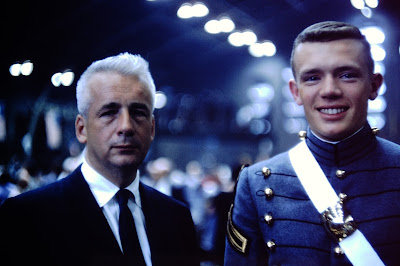 |
| Maddie - 5 am Wake-up |
For Maddie a walk in the dark is really no different from a walk in the noonday sun. She's just happy to be out in the world where she can enjoy its variety of smells and sounds. Unlike most people, the average dog is easy to please. If a dog enjoys something, it never tires of it. Indeed, dogs seem to thrive in a well-regulated, habit-driven environment.
We, of course, break all the rules of dog ownership. She sleeps with us on our king-size bed, and for someone who weighs only 15 pounds, seems to take up a lot of room. She also demands long stretches of belly-rubbing each morning before rising. Of course, Diane obliges.
Maddie is a rescued Bichon Frise, already six years old when she entered our home. Her life during those first six years is a complete mystery to Dear Diane and me, so we cut her a lot of slack and just enjoy her uniqueness. And, believe me, she arrived with her own personalized bundle of neuroses. For example, she dislikes riding in the car, but loves to ride in the golf cart. Of course, she's usually restrained in the backseat of the car, but sits next to me or on my lap in the golf cart. Her aversion to the car might also have something to do with the 7,000 mile, cross-country road trip we took just two weeks after she joined our little family.
 |
| Ready to Walk |
Maddie's also rather un-doglike in her eating habits. We feed her twice daily, after her morning and late afternoon walks, but she'll often leave a bowlful of food uneaten for hours. On Thursday, for example, we filled her bowl at 6 a.m. and it hadn't been touched when we returned from the soup kitchen at 1 p.m. I've never known a dog to do that. All our previous dogs treated each meal as if it were their last. And yet, once Maddie realized we were home for the day, she went into the kitchen and emptied her bowl. It would seem she associates eating with our presence, although oddly she will not eat if either of us are in the same room. It's all quite perplexing, but there's more.
Maddie likes most humans and really doesn't discriminate. If she spots a dog-less person walking toward us she will
often sit down and wait. When the person finally arrives she excitedly
offers licks and hugs. She's this way with everyone...except one man,
who lives a few blocks away. Whenever Maddie sees him she utters one of
those low growls, and if he approaches she barks at him. It's all very
strange since she acts this way with no one else. Makes you wonder,
doesn't it?
When it comes to dogs, however, she's far more circumspect. On our walks, she'll approach other dogs but always gingerly. If the other is friendly, she responds accordingly; but if she senses hostility -- and there are many little, ankle-biting Yorkies here in The Villages -- she simply backs off and avoids the offensive creature. I've seen her bark and growl at another dog only once, and he was particularly nasty old dog. Interestingly, she seems to have developed a crush on a little neighborhood Westie named Odie. It was love at first sight and has continued. If their paths cross she rushes toward him excitedly, and if we pass by his home she stares hopefully at the front door.
When it comes to dogs, however, she's far more circumspect. On our walks, she'll approach other dogs but always gingerly. If the other is friendly, she responds accordingly; but if she senses hostility -- and there are many little, ankle-biting Yorkies here in The Villages -- she simply backs off and avoids the offensive creature. I've seen her bark and growl at another dog only once, and he was particularly nasty old dog. Interestingly, she seems to have developed a crush on a little neighborhood Westie named Odie. It was love at first sight and has continued. If their paths cross she rushes toward him excitedly, and if we pass by his home she stares hopefully at the front door.
Maddie has no street smarts whatsoever. Before crossing the street she doesn't check for cars, but just goes. Our other dogs seemed to realize that moving cars are large, fast, and potentially deadly objects, things to avoid. Fortunately, I still have the will to live and always restrain her on a leash. So far neither of us have been squished by a speeding SUV.
I offer these thoughts today for those considering bringing a dog into your home, especially those of you who, like Dear Diane and me, are retired. Owning a dog in retirement is far different from owning one with a houseful of children. Maddie has been a wonderful addition to our home, but a needy and demanding addition. And while your life with a dog will change drastically, I know Diane will agree that in our case the change has been a delightful one. Maddie, who sleeps at my feet as I type, is definitely a keeper. I trust she feels the same about us.
I offer these thoughts today for those considering bringing a dog into your home, especially those of you who, like Dear Diane and me, are retired. Owning a dog in retirement is far different from owning one with a houseful of children. Maddie has been a wonderful addition to our home, but a needy and demanding addition. And while your life with a dog will change drastically, I know Diane will agree that in our case the change has been a delightful one. Maddie, who sleeps at my feet as I type, is definitely a keeper. I trust she feels the same about us.










